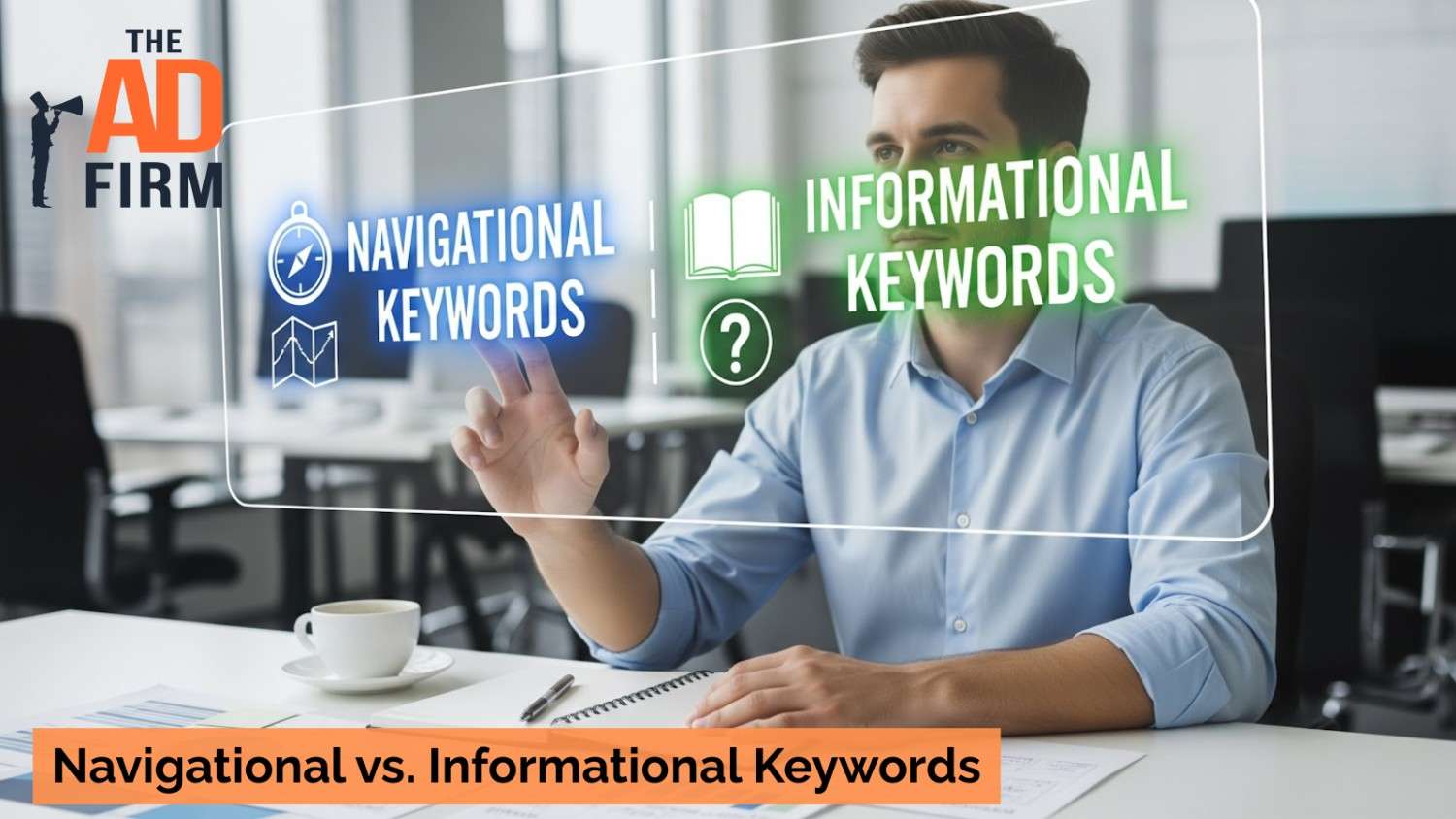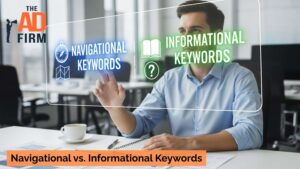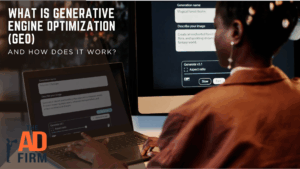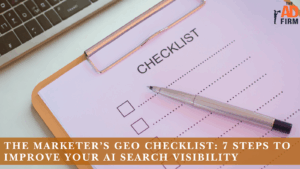Search engines work best when they connect people with the answers or pages they were truly looking for. This is why understanding the “intent” behind a keyword is just as important as the keyword itself. When businesses overlook intent, even the right keyword can fail to deliver results.
An experienced SEO company knows that different keyword types signal different goals, and optimizing for those differences makes all the difference.
This blog explains two of the most important keyword types, navigational and informational. You’ll learn what they mean, why they matter, and how tailoring your content to each can improve both rankings and user satisfaction.
Why Search Intent Matters in SEO
When users type a phrase into Google, they’re not just throwing words at the search bar — they have a goal in mind. It could be to reach a specific website, find an explanation, or gather ideas before making a decision. Search engines work to deliver the results that best match that goal.
For businesses, this means that using the right keywords isn’t enough. Success comes from matching the type of content you create with what people actually want to see. Navigational and informational keywords are two of the clearest ways to understand intent. By learning how to use them correctly, you can create content that ranks higher, satisfies readers, and guides them naturally toward your brand.
Understanding Navigational Keywords
Navigational keywords are search phrases people use when they already know where they want to go. Instead of exploring options, they are trying to reach a specific site, brand, or page as quickly as possible. Think of them like typing an address into a GPS, the user already has a destination in mind.
Examples are straightforward: “Nike official site,” “Facebook login,” or “YouTube homepage.” In each case, the searcher isn’t looking for general information. They want to land on one exact page and won’t be satisfied if the results point elsewhere.
For businesses, these searches matter because they determine whether your audience can actually find you. If your site doesn’t appear when someone types in your brand name or key pages, you risk losing trust and traffic. Making sure your homepage, login page, and other core destinations rank clearly for your brand terms is essential for visibility and credibility.
Elevate Your Market Presence with The Ad Firm
- SEO: Boost your search engine visibility and supercharge your sales figures with strategic SEO.
- PPC: Target and capture your ideal customers through highly optimized PPC campaigns.
- Social Media: Engage effectively with your audience and build brand loyalty through targeted social media strategies.
Understanding Informational Keywords
Informational keywords are used when people want to learn something, not necessarily make a purchase. These searches reflect curiosity, problem-solving, or a desire to understand a topic better before making decisions.
Examples include “how to wash bedding,” “what is SEO,” or “tips for growing tomatoes.” Each shows that the searcher is looking for an explanation, instructions, or advice. They are not ready to buy but are actively seeking helpful, trustworthy content.
For businesses, informational keywords are valuable because they help build authority early in the customer journey. When your content answers questions clearly, readers start to see your brand as a reliable resource. Over time, this trust can lead them back to your products or services when they’re ready to make a decision.
How to Optimize Each Keyword Type (Core Strategies)
Knowing the difference between navigational and informational keywords is only the first step. To achieve results, you need to optimize your content to match what people expect when they search for each type of query on Google. Below are clear strategies for both.
Key Strategies for Navigational Keywords
Navigational keywords help people find you quickly and without confusion. Your goal here is to make sure your brand appears front and center.
- Strengthen brand presence: Optimize your site’s title tags, meta descriptions, and online listings so your brand consistently shows up first. This helps users immediately find your official site instead of clicking on competitors or irrelevant results. Strong branding in search results builds recognition and reinforces trust in your business. Without this optimization, you risk losing people who are already looking specifically for you.
- Polish site navigation and on-page elements: Ensure your homepage, login, and service pages are clear and accessible, with apparent links to the most critical sections. When users click these pages, they should instantly recognize they’ve reached the right place. Simple menus, clear headings, and logical layouts reduce confusion and improve usability. A seamless structure encourages people to stay on your site rather than leave to look elsewhere.
- Improve user trust and experience: Keep your site fast, mobile-friendly, and consistent in branding so users immediately know they’re in the right place. Partnering with a digital marketing agency can also help maintain this consistency across channels and ensure brand-focused searches always point to the right pages. Consistency in logos, colors, and messaging helps users feel confident they’re dealing with the real brand. If pages load slowly or look unprofessional, even loyal users may doubt the site’s legitimacy. Prioritizing user experience ensures visitors stay, explore, and complete the tasks they came for.
Key Strategies for Informational Keywords
Informational keywords are about satisfying curiosity and answering questions. Optimizing for them requires a helpful, educational approach.
Boost Your Business Growth with The Ad Firm
- PPC: Optimize your ad spends with our tailored PPC campaigns that promise higher conversions.
- Web Development: Develop a robust, scalable website optimized for user experience and conversions.
- Email Marketing: Engage your audience with personalized email marketing strategies designed for maximum impact.
- Build educational resources: Create blog posts, guides, and tutorials that answer specific questions or explain concepts clearly. In ecommerce SEO, for example, detailed product guides or how-to articles can build trust with shoppers long before they’re ready to buy.
By clearly solving problems, you make it easier for users to understand and apply the information. Educational resources also show that your brand is willing to help before asking for a sale. This generosity builds trust and keeps people coming back when they’re ready to move further in their journey.
- Target long-tail questions and broad topics: Use specific search phrases like “how to,” “best ways to,” or “tips for” that reflect the early research stage. These keywords capture users who want detailed explanations rather than quick answers.
Long-tail searches also reduce competition because they focus on a narrower group of users. By targeting them, you attract visitors who are more engaged and more likely to value your content.
- Encourage discoverability and sharing: Design your content with features that make it easy to spread, such as share buttons, visuals, or quotable takeaways. When people share your content, it reaches new audiences without extra cost.
Shared and cited content often earns backlinks, which help search engines view your site as more authoritative. The combination of visibility and credibility strengthens your overall online presence.
Bringing Both Keyword Types Together
The most effective SEO strategies combine navigational and informational keywords. By balancing both, you create a stronger and more complete online presence.
- Balance branding and education: Navigational content helps users find your brand, while informational content demonstrates your expertise on topics they care about. These two types of content work best together, since one makes you visible and the other builds credibility. Ignoring either creates gaps where competitors can step in. A healthy mix means you reach people at every stage of their online journey.
- Map keywords to user intent: Assign each keyword carefully to either navigational or informational content to keep intent clear. This separation prevents your pages from competing against each other in search results.
It also helps search engines understand which page serves which purpose. The result is stronger performance for both types of content without confusion.
Advance Your Digital Reach with The Ad Firm
- Local SEO: Dominate your local market and attract more customers with targeted local SEO strategies.
- PPC: Use precise PPC management to draw high-quality traffic and boost your leads effectively.
- Content Marketing: Create and distribute valuable, relevant content that captivates your audience and builds authority.
- Guide users through the funnel: Link informational content, such as blog posts, to navigational pages like your homepage or service pages. This connection moves readers naturally from learning to engaging with your brand.
Instead of stopping at answers, users now know where to go for your products or services. Internal linking creates a pathway that keeps readers moving forward instead of leaving your site.
Read Also: Content SEO: Matching Keywords with Intent
Common Mistakes to Avoid With Navigational and Informational Keywords
Even with the best intentions, businesses often misuse these keyword types, which can hurt performance. Knowing the pitfalls helps you avoid wasted effort and create content that actually meets user needs.
- Overloading navigational pages with extra keywords: Some businesses try to force unrelated informational terms onto branded pages. This confuses both users and search engines, weakening the page’s focus. Keep navigational pages focused solely on helping people reach your brand or services quickly. Simplicity here creates stronger visibility.
- Publishing informational content that feels like a sales pitch: Readers searching for “how to” or “tips” want clear answers, not a disguised advertisement. Mixing sales-heavy language into educational content can actually drive people away. Instead, provide real value first and guide readers gently toward your brand. This builds credibility before conversion.
- Ignoring how users phrase their searches: Businesses sometimes assume they know what people type, but real search queries often look different. For example, users may add location or intent words like “best,” “near me,” or “examples.” This is especially true for local SEO services, where missing location-based modifiers can lead to weak visibility in regional results. Studying real queries ensures accuracy and keeps your content aligned with what people are genuinely searching for.
- Treating all keywords the same in reporting: Looking at total traffic without separating navigational from informational makes insights fuzzy. A page might appear successful due to its high visit count, but those visits may not match its intended purpose. Breaking down metrics by keyword type gives a more accurate picture of performance. This clarity helps refine strategy over time.
- Failing to connect informational content to navigational pages: Many businesses publish blogs that never link back to their main site or services. This leaves readers informed but with no path forward. Linking smoothly from education to brand pages keeps the user journey alive. Without it, you risk losing potential customers before they act.
Strengthen Your SEO with Intent-Driven Keywords
If your content isn’t performing as well as it should, the issue may be a gap between what users expect and what your pages deliver. The Ad Firm helps businesses align with search intent by optimizing for both navigational and informational keywords.
Enhance Your Brand Visibility with The Ad Firm
- SEO: Enhance your online presence with our advanced SEO tactics designed for long-term success.
- Content Marketing: Tell your brand’s story through compelling content that engages and retains customers.
- Web Design: Design visually appealing and user-friendly websites that stand out in your industry.
Their strategies ensure your brand is easy to find when people search for you directly, while also building authority with educational content that attracts new audiences. By combining these approaches, they create a clear path from awareness to action, driving stronger results across the entire customer journey.
If you’re ready to make every keyword work harder for your business, reach out to The Ad Firm and start building a content plan tailored to real user intent.





